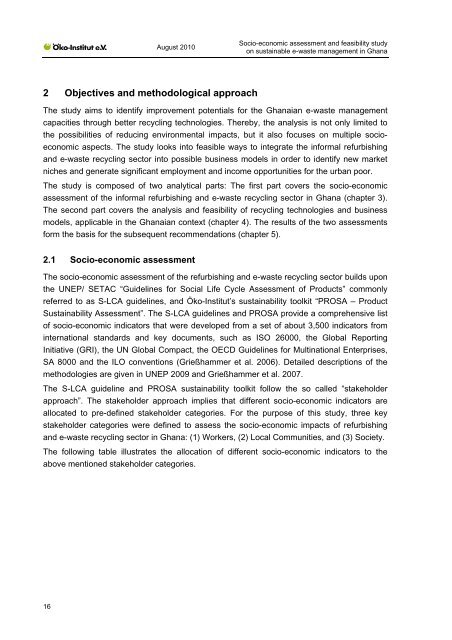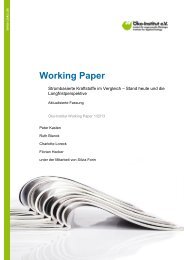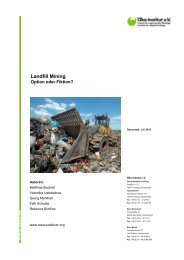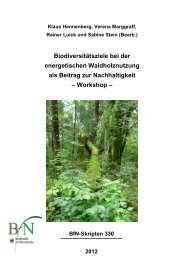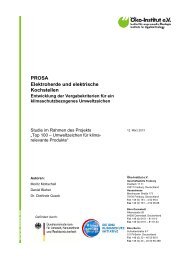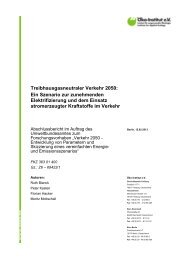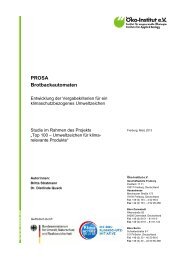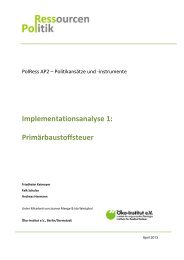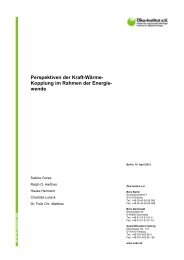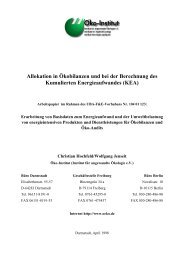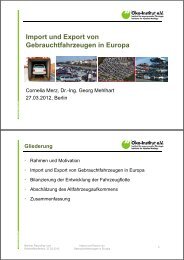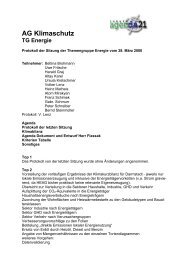Socio-economic assessment and feasibility study on - Öko-Institut eV
Socio-economic assessment and feasibility study on - Öko-Institut eV
Socio-economic assessment and feasibility study on - Öko-Institut eV
Create successful ePaper yourself
Turn your PDF publications into a flip-book with our unique Google optimized e-Paper software.
16<br />
August 2010<br />
2 Objectives <str<strong>on</strong>g>and</str<strong>on</strong>g> methodological approach<br />
<str<strong>on</strong>g>Socio</str<strong>on</strong>g>-<str<strong>on</strong>g>ec<strong>on</strong>omic</str<strong>on</strong>g> <str<strong>on</strong>g>assessment</str<strong>on</strong>g> <str<strong>on</strong>g>and</str<strong>on</strong>g> <str<strong>on</strong>g>feasibility</str<strong>on</strong>g> <str<strong>on</strong>g>study</str<strong>on</strong>g><br />
<strong>on</strong> sustainable e-waste management in Ghana<br />
The <str<strong>on</strong>g>study</str<strong>on</strong>g> aims to identify improvement potentials for the Ghanaian e-waste management<br />
capacities through better recycling technologies. Thereby, the analysis is not <strong>on</strong>ly limited to<br />
the possibilities of reducing envir<strong>on</strong>mental impacts, but it also focuses <strong>on</strong> multiple socio<str<strong>on</strong>g>ec<strong>on</strong>omic</str<strong>on</strong>g><br />
aspects. The <str<strong>on</strong>g>study</str<strong>on</strong>g> looks into feasible ways to integrate the informal refurbishing<br />
<str<strong>on</strong>g>and</str<strong>on</strong>g> e-waste recycling sector into possible business models in order to identify new market<br />
niches <str<strong>on</strong>g>and</str<strong>on</strong>g> generate significant employment <str<strong>on</strong>g>and</str<strong>on</strong>g> income opportunities for the urban poor.<br />
The <str<strong>on</strong>g>study</str<strong>on</strong>g> is composed of two analytical parts: The first part covers the socio-<str<strong>on</strong>g>ec<strong>on</strong>omic</str<strong>on</strong>g><br />
<str<strong>on</strong>g>assessment</str<strong>on</strong>g> of the informal refurbishing <str<strong>on</strong>g>and</str<strong>on</strong>g> e-waste recycling sector in Ghana (chapter 3).<br />
The sec<strong>on</strong>d part covers the analysis <str<strong>on</strong>g>and</str<strong>on</strong>g> <str<strong>on</strong>g>feasibility</str<strong>on</strong>g> of recycling technologies <str<strong>on</strong>g>and</str<strong>on</strong>g> business<br />
models, applicable in the Ghanaian c<strong>on</strong>text (chapter 4). The results of the two <str<strong>on</strong>g>assessment</str<strong>on</strong>g>s<br />
form the basis for the subsequent recommendati<strong>on</strong>s (chapter 5).<br />
2.1 <str<strong>on</strong>g>Socio</str<strong>on</strong>g>-<str<strong>on</strong>g>ec<strong>on</strong>omic</str<strong>on</strong>g> <str<strong>on</strong>g>assessment</str<strong>on</strong>g><br />
The socio-<str<strong>on</strong>g>ec<strong>on</strong>omic</str<strong>on</strong>g> <str<strong>on</strong>g>assessment</str<strong>on</strong>g> of the refurbishing <str<strong>on</strong>g>and</str<strong>on</strong>g> e-waste recycling sector builds up<strong>on</strong><br />
the UNEP/ SETAC “Guidelines for Social Life Cycle Assessment of Products” comm<strong>on</strong>ly<br />
referred to as S-LCA guidelines, <str<strong>on</strong>g>and</str<strong>on</strong>g> Öko-<strong>Institut</strong>’s sustainability toolkit “PROSA – Product<br />
Sustainability Assessment”. The S-LCA guidelines <str<strong>on</strong>g>and</str<strong>on</strong>g> PROSA provide a comprehensive list<br />
of socio-<str<strong>on</strong>g>ec<strong>on</strong>omic</str<strong>on</strong>g> indicators that were developed from a set of about 3,500 indicators from<br />
internati<strong>on</strong>al st<str<strong>on</strong>g>and</str<strong>on</strong>g>ards <str<strong>on</strong>g>and</str<strong>on</strong>g> key documents, such as ISO 26000, the Global Reporting<br />
Initiative (GRI), the UN Global Compact, the OECD Guidelines for Multinati<strong>on</strong>al Enterprises,<br />
SA 8000 <str<strong>on</strong>g>and</str<strong>on</strong>g> the ILO c<strong>on</strong>venti<strong>on</strong>s (Grießhammer et al. 2006). Detailed descripti<strong>on</strong>s of the<br />
methodologies are given in UNEP 2009 <str<strong>on</strong>g>and</str<strong>on</strong>g> Grießhammer et al. 2007.<br />
The S-LCA guideline <str<strong>on</strong>g>and</str<strong>on</strong>g> PROSA sustainability toolkit follow the so called “stakeholder<br />
approach”. The stakeholder approach implies that different socio-<str<strong>on</strong>g>ec<strong>on</strong>omic</str<strong>on</strong>g> indicators are<br />
allocated to pre-defined stakeholder categories. For the purpose of this <str<strong>on</strong>g>study</str<strong>on</strong>g>, three key<br />
stakeholder categories were defined to assess the socio-<str<strong>on</strong>g>ec<strong>on</strong>omic</str<strong>on</strong>g> impacts of refurbishing<br />
<str<strong>on</strong>g>and</str<strong>on</strong>g> e-waste recycling sector in Ghana: (1) Workers, (2) Local Communities, <str<strong>on</strong>g>and</str<strong>on</strong>g> (3) Society.<br />
The following table illustrates the allocati<strong>on</strong> of different socio-<str<strong>on</strong>g>ec<strong>on</strong>omic</str<strong>on</strong>g> indicators to the<br />
above menti<strong>on</strong>ed stakeholder categories.


